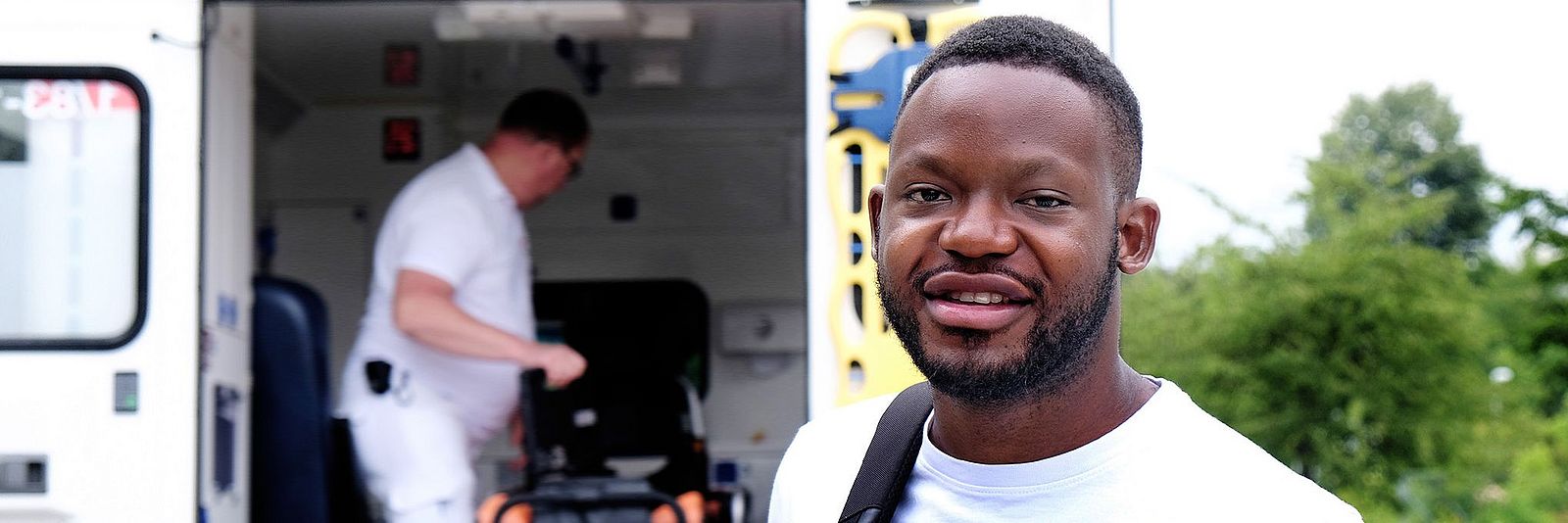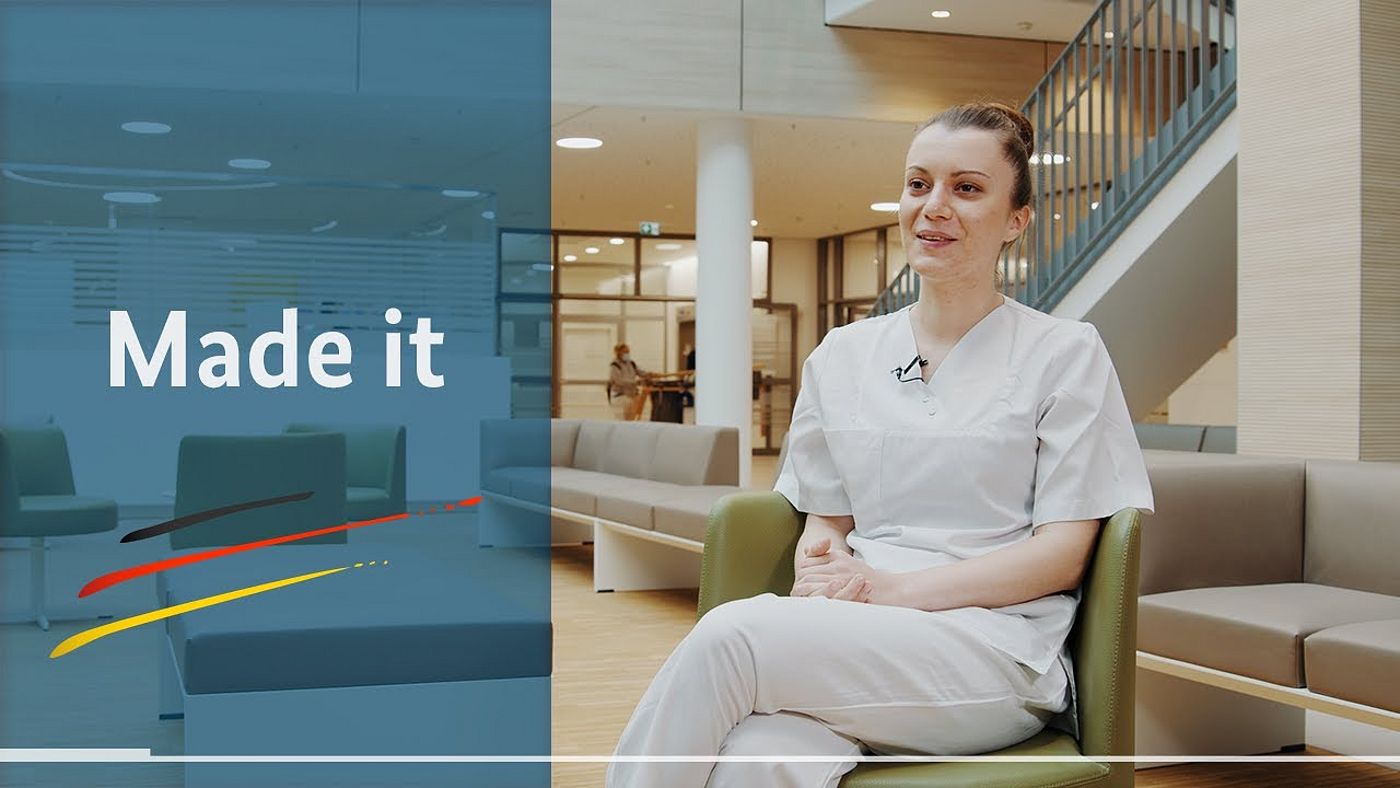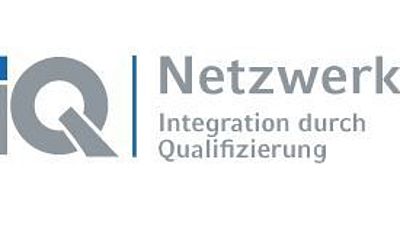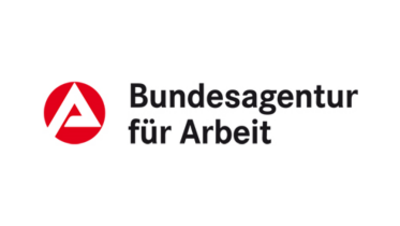
Nursing professionals
Would you like to work as a nurse in Germany? Find more information on your career options here.
Working in Germany as a nursing professional
Thanks to the excellent living conditions in Germany, a considerable proportion of the population enjoys good health well into old age. However, with increasing life expectancy and an ageing society, combined with the decreasing number of young people beginning their professional career, the demand for professional nursing as well as basic medical care is rising. Germany does have a stable healthcare system; nevertheless, nursing professionals remain to be in high demand and their contribution is more important than ever. Hospitals, long-term care facilities and other healthcare facilities are always on the lookout for nurses with various levels of qualification in order to meet the increasing demand in the healthcare and nursing professions. This demand is predicted to increase in the following years. International nurses have long been an important pillar in German hospitals and care facilities. As a result, there are an increasing number of multicultural teams working in German healthcare facilities.
Would you like to become part of the German healthcare system and work in multicultural teams in many different locations in Germany? Here you can find out how to start your future-proof career in the healthcare sector!
Your tasks in the nursing field
As a nurse, you will care for people of all ages and support them in every phase of their life. In Germany, the title “Pflegefachfrau/-mann” or “Pflegefachperson” is now used for nurses, which includes health and nursing care, paediatric nursing and geriatric nursing.
Nurses may work in the following areas:
- Inpatient acute care (e.g. hospital)
- Inpatient long-term care (e.g. nursing home)
- Ambulatory care (home care for private individuals)
- Medical rehabilitation (outpatient and inpatient)
- Palliative care (outpatient and inpatient)
Your tasks in the nursing field will include independent observation, guidance, support and care of patients, both inpatient and outpatient treatment. Additionally, you may also document and evaluate nursing measures, as well as carry out medical instructions and assist with medical interventions. However, that will depend on your individual specialisation and qualification. As a nurse, you will also be an expert contact for the patient’s family.
Basic care activities make up a large part of the daily work of nurses in Germany. This is not the responsibility of family members or exclusively of nursing assistants, but to a large extent also of nurses. Basic care activities include personal hygiene, nutrition, mobility, promotion of independence and preventive measures (prophylaxis).

Video: Working as a nurse - a success story
Figures on nursing professionals in Germany
People who can work as nursing professionals in Germany
Nursing is a regulated profession in Germany. Those wishing to work in the nursing profession in Germany on a long-term basis require official authorisation to practise their profession. As a rule, the following formal requirements must be met in order to be permitted to work in the nursing profession in Germany:
- Recognised qualification: The nursing qualification obtained in your country of origin must be recognised in Germany. You have two options: You can either have an equivalence assessment carried out on the basis of your training records, or you can waive this and complete an adaptation programme directly. If you choose the first option, the competent authority will check your documents to see whether your qualification is equivalent to a German qualification. The German qualification “Pflegefachfrau/-mann” or “Pflegefachperson” (nurse) is regarded as the reference occupation. If your qualification differs from the German qualification, you can take a knowledge test or go through an adaptation period to prove that you have an equivalent level of knowledge. With the second option, you can voluntarily sign a waiver of the equivalence assessment and be given the opportunity to complete an adaptation programme directly. This will shorten the procedure and reduce the administrative costs. However, the qualifications you have already acquired (e.g. further training) and your professional experience will then not be taken into account. As a result, the knowledge test or adaptation period may be more extensive than if the equivalence assessment is used. You have the right to receive guidance before making a decision. The Service Center for Professional Recognition (ZSBA) can give you free advice on waiving the equivalence assessment. The application for professional recognition can be submitted to the competent authority in the state in which you intend to work in. The German professional recognition obtained is valid nationwide.
- Sufficient knowledge of the German language: For recognition, you must have at least level B2 according to the Common European Framework of Reference for Languages (CEFR).
- Medical fitness: You will need to provide a certificate proving that you are physically and mentally fit to work as a nurse. This can be a certificate from your country of origin or a medical certificate issued in Germany.
- Personal suitability/Trustworthiness: In order to prove your trustworthiness, you will require proof that you do not have a criminal record. Depending on your situation, it is sufficient to provide a certificate of good conduct or standing from your country of origin or a German certificate of conduct.
The decisive factor for the recognition of your qualification is not your nationality, but the place your qualification was obtained in. Nurses from EU/EEA countries and Switzerland generally receive automatic recognition of their foreign qualifications. You can find more information on the topic of recognition, examinations, a grant towards the cost of the recognition procedure, adaption periods and the competent German authorities responsible on the “Recognition in Germany ” portal (available in multiple languages) or in our “Recognition” section.
Counselling available abroad
The ProRecognition project also provides advice on professional recognition for nurses qualified abroad.
Visa for nursing professionals: when is it necessary?
As a citizen of the European Union, Liechtenstein, Iceland, Norway or Switzerland, you require neither a visa nor a residence permit to work in Germany. Citizens of other countries on the other hand require a residence permit. You can find out more about the work visa for qualified professionals in the “Visa” section.
No EU Blue Card for nursing professionals
Please note that the EU Blue Card does not apply to nursing professionals.
Did you apply for recognition of your foreign qualification and the certification authority in Germany has determined that you are missing certain qualifications to obtain full recognition? Then you can find out whether the visa for the recognition of foreign qualifications is an option for you.
If you have not yet applied for your qualification to be recognised, you can start the process after you arrive in Germany and obtain a residence title for another job in the meantime. One of the requirements for this is that you can provide proof of a foreign non-academic vocational qualification requiring at least two years of training or a foreign academic qualification. This qualification must be recognised by the government of the country in which you obtained it. In addition, you must already have a German employment contract and your employer must have entered into a “recognition partnership” with you. You must be able to demonstrate German language skills at level A2 of the Common European Framework of Reference for Languages (CEFR). Detailed information can be found in the section “Visa for employment within the framework of a recognition partnership”.
If your qualification as a nursing professional is not recognised, you can also apply for recognition as a nursing assistant. For more information, see the “Assistants in nursing” section.
Enter Germany with an opportunity card to look for a job
Would you like to look for a suitable employer in Germany? Under certain conditions, you can enter Germany with an opportunity card to look for work.
Assistance in finding a job: placement and programmes
There are several interesting projects providing special opportunities to work as a nurse from abroad in Germany. However, finding a job in Germany does not necessarily have to be through a recruitment programme: the Customer Center of the Federal Employment Agency advises, places and supports prospective immigrants on an individual basis.
Information on placement agencies
If you are considering seeking additional assistance with the immigration process to Germany, you can find basic information on private and government agencies in Germany in the “Placement agencies” section.
Government recruitment projects
There are several interesting projects offering special opportunities to work as a foreign nursing professional in Germany.
Triple Win programme
The Triple Win programme is implemented jointly by the Federal Employment Agency (BA) and the GIZ. The foundation of the project is formed by placement agreements between the BA and the partner countries' employment authorities (the Philippines, Tunisia, Indonesia, Jordan and Kerala/ Telangana (India)).
The partner authority organises the application procedure locally and checks the incoming applications according to formal criteria. GIZ organises language courses (up to level B1) as well as language training for nurses in the applicants’ country of origin. These courses can help you learn about the differences between health systems, as well as career opportunities and medical terminology. In Germany, GIZ helps migrant nurses deal with the authorities, open a bank account, take out health insurance and get their qualifications recognised.
The new arrivals work as nursing assistants until their foreign qualification in the field of nursing and patient care has been recognised. More information on the triple Win project can be found in this video .
“Nursing in Germany” project:
The Federal Employment Agency (BA) – in partnership with the National Employment Offices – is looking for qualified healthcare and nursing personnel from Mexico and Colombia for Germany's public health service. The “Nursing in Germany” project gives interested nursing professionals from Mexico and Colombia new career prospects. German employers in the healthcare sector present their job opportunities at various locations and events in Mexico and Colombia.
Those wishing to take part in the project should be willing to relocate, show interest in working abroad and be prepared to obtain the necessary skills in the German language within 12 months. An academic qualification from a national university is also required. The nurses receive several forms of support on their way to Germany: for example, financing of language courses, funded guidance when applying for a visa and support for the recognition of non-adademic vocational qualifications.
Find more information on the BA and the Mexican Employment Authority's project on the “Nursing in Germany ” website and in this video .
The “Fair Recruitment Healthcare Germany” quality seal
A good way to recognise reputable healthcare recruitment agencies is to look for the official “Fair Recruitment Healthcare Germany ” quality seal, which was developed in Germany in 2022. Agencies with the quality seal guarantee a transparent recruitment process from the outset. This means that all agreements are in writing and easy to understand, your future employer covers all costs associated with the recruitment process and you join a well-prepared team. You can find out more about the quality seal in the "Placement agencies" section.

Your entry into nursing - the next steps
✔ Your career prospects: with our Quick-Check, you can find out about the opportunities available to you for working and living in Germany.
✔ Start the recognition process: in our “Recognition” section, you can find more information on the recognition of foreign qualifications.
✔ Apply now: find a suitable job position in our “Make it in Germany” job listings and use our tips for a successful job application in Germany.
✔ German language: get useful tips on the best places and methods to learn German in the “Learning German” section! The “IMED-KOMM” platform offers a comprehensive online course entitled “German for foreign health and nursing professionals ” In addition, Network IQ offers the free app “Ein Tag Deutsch in der Pflege ” (A day of German in nursing) featuring real-life scenarios and communication exercises.
Information on the web
- Federal Ministry for Economic Affairs and Energy (BMWE) Information on the care sector in Germany
- Federal Employment Agency (BA) Summary information Nursing professionals (vocational training)
- Recognition in Germany Recognition of qualifications obtained abroad in the healthcare and nursing sector
- German Competence Centre for International Skilled Workers in the Health and Nursing Professions (DKF) “Fair Recruitment Healthcare Germany” quality seal
- Network IQ Overview of the recgonition and entry procedure for nurses
- NETZWERK Unternehmen integrieren Flüchtlinge Vocabulary pamphlet for Nursing professionals (in English, Spanish, French, Portuguese) Vocabulary pamphlets for other professions and languages
Do you have any questions?
Let us advise you on your opportunities to work and live in Germany. Our experts will support you with questions regarding job search, visa, recognition and learning German.
You can find out more about the various contact options by clicking on one of the icons in the bar below.


![[Translate to English:] Erklärvideo: Wie finde ich einen Job in Deutschland?](/typo3temp/assets/_processed_/2/c/csm_youtube_b272f4eca24cc896849827904109b23e_d3bea852bb.jpg)




